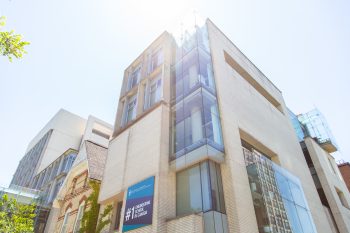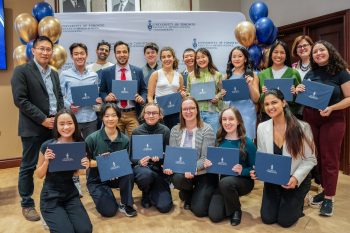Professors Shana Kelley, Michael Sefton and Gang Zheng of the Institute of Biomaterials & Biomedical Engineering (IBBME) have received nearly $6.5 million in research funding from the Canadian Institutes of Health Research (CIHR), it was announced on Monday. These grants come from the Emerging Team Grant: Regenerative Medicine and Nanomedicine program which will back IBBME research projects for four- and five-year terms.
Professor Kelley’s project, Microchip-based Devices for the Analysis of Circulating Prostate Cancer Markers, involves developing a non-invasive screening for prostate cancer and the early detection of the disease. An approach relying on nanotechnology will be employed to produce very sensitive, accurate devices that will sense the presence of prostate cancer cells in the blood, and will analyze the aggressiveness of the disease by detecting molecules that can report on the type of tumour present.
Her team of principal investigators includes Dr. Robert Nam, Professor Edward Sargent (ECE) and Professor Aaron Wheeler. She received $1,735,400 for a four-year term.
Professor and former IBBME director Micheal Sefton received $2,335,000 for a five-year term to examine the influence of endothelial cell (EC) interactions with other cell types, as well as the effects of blood flow. The new knowledge obtained on EC function during remodeling will be used to design novel therapies with a view to achieving improved/accelerated vascularization. The project, Vascularized Tissue Engineered Constructs, is being carried out by Professors Sefton, Professor Myron Cybulsky, Dr. Philip Marsden and Professor Craig Simmons (MIE).
Nanotechnology-enabled Image-guided Interventions in Vascular and Lung Disease is another IBBME research project being investigated by Professor Gang Zheng, Professor Warren Chan (IBBME) and Professor Brian Wilson. This project will develop, and accelerate to clinical trial readiness, novel technologies based on nanoparticles (NP) that are targeted to lung cancer and atherosclerosis, combined with optical imaging technologies. These diseases are major killers with huge health and socioeconomic costs. Funding is secured for a five-year term at $2,317,262.
In total, IBBME garnered nearly half of the funding being offered through this CIHR peer-review program. This kind of recognition earmarks IBBME as a world-leading biomedical engineering institute or department.
IBBME is Canada’s leading biomedical engineering program in North America. Students and faculty participate in innovative educational programs and high-impact research to underpin this leadership. Such leadership draws on the strengths of Canada’s best Faculties: U of T Applied Science & Engineering, Dentistry and Medicine. IBBME is also located near the geographic centre of one of the leading Health Sciences Complexes in North America.
IBBME combines core strength in biomedical engineering with a spirit of collaboration that enables it to work closely with many cognate units at the University of Toronto.



